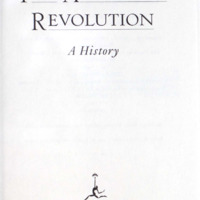-
Title
-
The American Revolution : a history
-
Description
-
Chronicles and examines the American Revolution, discussing its character and its consequences, covering such topics as republicanism, the Philadelphia Convention, and the debate between the Federalists and Anti-Federalists.
-
Identifier
-
993898
-
679640576
-
Creator
-
Wood, Gordon S
-
Format
-
Modern library ed.
-
Source
-
Brian Lamb Booknotes Collection
-
SC&A Copy Gift of Brian Lamb, 2011.
-
Catalog record
-
Language
-
eng
-
Date
-
2002
-
Program air date: April 21, 2002.
-
Publisher
-
Modern Library
-
George Mason University. Libraries. Special Collections & Archives
-
Text
-
Transcription of Annotations
Front end papers contain notes on the First Continental Congress; the age of King George, III; the population of the colonies of Virginia, New York, New Jersey and Rhode Island; the nature and purpose of state constitutions, and a chronology of events leading to the revolution. Notes on back end papers refer to the number of colleges in U.S. in 1776, the status of women, the nature of slavery, religion, equality as the most powerful idea of American history, trade negotiations with other countries, different forms of government, and important military campaigns. -- Annotations by Brian Lamb in the margins and underlining of pertinent phrases throughout the book. -- Examples: p. xxv: "How the Revolution came about, what its character was, and what its consequences were - not whether it was good or bad - are the questions this brief history seeks to answer." -- "20th century: Birth of professional History writing; Now: some think [that] Revolution was a failure." -- p. 10: "Confused, lied to, and cheated of their land and their furs by greedy white traders and land-hungry migrants, the Indians retaliated with atrocities and raids." -- p. 47: Americans saw themselves striving not only to make themselves free, but also to bring freedom to the whole world." -- p. 68: Hence, the new constitutions absolutely barred all executive officeholders and those receiving profits from the government from sitting in the legislatures." -- p. 94: "Republicanism thus stressed a morality of social cohesion and devotion to the common welfare, or 'res publica'". -- p. 102: "Jefferson expressed great doubts about the intellectual abilities of blacks, but he conceded that in their moral sense they were the equal of whites." -- p. 123: "Americans knew that tyranny was founded on ignorance." -- p. 133: "By destroying traditional structures of authority, the Revolution opened new religious opportunities for the illiterate, the lowly, and the dependent." -- p. 166: "The emergence of this rambunctious middling democracy was the most significant consequence of the American Revolution."
-
Relation
-
Original Booknotes interview
-
Rights
-
This work may be protected by copyright laws and is provided for educational and research purposes only. Any infringing use may be subject to disciplinary action and/or civil or criminal liability as provided by law. If you believe that you are the rights-holder and object to Mason’s use of this image, please contact speccoll@gmu.edu.
 993898.pdf
993898.pdf